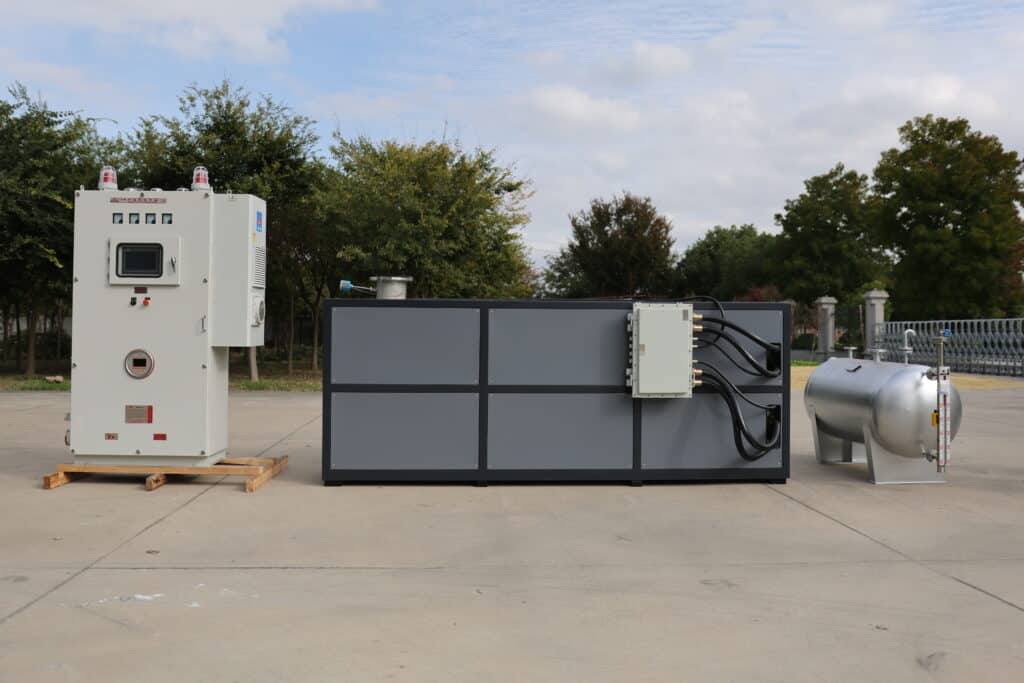Thermal oil boiler is a device that uses thermal oil as a carrier to achieve heat transfer through high-temperature circulation, and its maximum working temperature directly determines the efficiency of industrial heating system and application scenarios. In the high temperature production process, the stability of the temperature and the limit of performance is crucial to ensure product quality and equipment safety.
Heat transfer oils are often designed for higher temperatures than water and steam systems, making them an important piece of equipment suitable for high temperature requirements. In many industries, such as chemical, pharmaceutical, food processing and textile, high temperature conditions are a core requirement for production.

What is the maximum operating temperature of heat transfer oil?
The maximum operating temperature of heat transfer oil used in heat transfer oil boilers is usually between 200°C and 400°C, depending on the following factors:
- Heat transfer oil type
- Mineral Heat Transfer Oil: The maximum operating temperature is usually around 280°C, which is suitable for low and medium temperature requirements.
- Synthetic heat transfer oil: It is widely used in high-temperature industrial fields due to its superior resistance to high-temperature oxidation, up to 300°C to 400°C.
- Boiler design
The design limit temperature of thermal oil boilers directly affects the actual operating temperature of thermal oil. Some of the high-end equipment uses higher specification materials, which can support the stable operation of heat transfer oil at temperatures close to its limit. - Circulatory system efficiency
The efficient circulation system can distribute the heat of the heat transfer oil evenly, avoiding local overheating, and at the same time effectively prolonging the service life of the oil. - Safety control systems
The boiler is equipped with temperature control equipment that prevents the system from exceeding the set temperature and ensures safe operation. Quality thermal oil boilers usually ensure that the temperature is precisely controlled within the rated range.
Influence of limit temperature of heat transfer oil on production
When selecting heat transfer oils and equipment, it is necessary to consider how well the maximum operating temperature matches the actual production requirements. Operating temperatures that are too low may not be adequate for high temperature processes, while operating at extreme temperatures for extended periods of time may lead to the following problems:
- Heat transfer oil deterioration: Long-term high temperature operation will accelerate the oxidative decomposition of the oil and reduce its heat transfer performance.
- Loss of equipment: Operation beyond the design temperature may result in deterioration or even damage to equipment components, increasing maintenance costs.
- production risk: Unstable temperatures can lead to product quality fluctuations and even safety accidents.
Therefore, it is recommended to select equipment and heat transfer oils with some redundancy in operating temperatures to ensure the safety and longevity of the equipment under high loads.
How do I ensure stability at the maximum operating temperature?
In order to guarantee the stable operation of the heat transfer oil boiler in practical application, the following measures are indispensable:
- Choosing Quality Heat Transfer Oil
- High-quality heat transfer oil has better oxidation resistance and thermal stability, and can be operated at high temperature for a long time without easy decomposition.
- Regularly check the condition of the heat transfer oil and replace the oil as needed to prevent malfunctions caused by oil deterioration.
- Regular maintenance of boiler systems
- Check that heating elements and circulation pumps are operating properly to ensure even heat distribution.
- Clean heat exchange surfaces to reduce the effect of dirt on thermal conductivity.
- Setting a reasonable temperature range
- Adjust the temperature according to the actual demand and try to avoid approaching the limit temperature of the heat transfer oil for a long time.
- Use a reliable temperature control system to monitor and adjust operating parameters in real time.
Application of heat transfer oil boiler in industry
Due to its excellent high temperature performance, thermal oil boilers are widely used in high temperature processes that require precise temperature control. Example:
- chemical production: High-temperature processes such as distillation, reaction and polymerisation.
- food processing: Baking, drying and heating equipment.
- textile printing and dyeing: High-temperature heat source required for dyeing and fixing processes.
Different applications in different scenarios have different temperature requirements for heat transfer oil, and users should choose the most suitable model according to the specific process.
Our company can non-standard custom products, click the menu bar to contact us to customise, you can also refer to the first!product pageAppreciate our company's products oh!
Recommended Reading:
